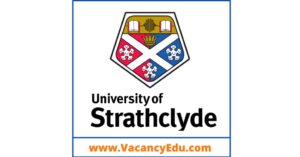University of Strathclyde, Glasgow, Scotland invites online Application for number of Fully Funded PhD Degree at various Departments. We are providing a list of Fully Funded PhD Programs available at University of Strathclyde, Glasgow, Scotland.
Eligible candidate may Apply as soon as possible.
(01) PhD Degree – Fully Funded
PhD position summary/title: Uncertainty quantification in CO2 calculations
Global warming is one of the biggest threats humanity faces today. Carbon dioxide (CO2) emissions from fossil fuels are warming our planet in a dangerous and irreversible way. Quantitative scientists must be able to quantify exactly and robustly the amount of CO2 emitted by humans to inform and support effective climate action. Although such an exact CO2 account seems obvious and necessary, it is currently done using approaches that lack scientific rigour and fail to properly account for uncertainties.
This PhD research will explore the challenges associated with the reliable quantification of CO2 emissions using the latest cutting-edge uncertainty quantification methods combined with modern digital and generative tools. These methods will take explicit and quantitative account of the randomness, vagueness and limited quality of CO2 data. Current methods for CO2 calculations are deterministic and entirely based on coarse grid conversion factors with little–if at all–mention of the uncertainty that such calculations can incur. This research seeks to bridge this gap, providing a more rigorous framework for CO2 emissions assessment.
Deadline : 1 August 2025
(02) PhD Degree – Fully Funded
PhD position summary/title: Dynamic digital scheduling for optimal outfitting of naval ships
Deadline : 31 August 2025
View All Fully Funded PhD Positions Click Here
(03) PhD Degree – Fully Funded
PhD position summary/title: Engineering system design of unscheduled care
Deadline : 15 May 2025
(04) PhD Degree – Fully Funded
PhD position summary/title: Carbon assessment of transforming CO2 and waste plastics into sustainable fuels and chemicals
This project explores converting CO₂ and waste plastics into platform chemicals and materials, focusing on explore reaction mechanisms over catalysts surface adopting both modelling and experiments. The goal is to develop a carbon mapping strategy for these conversions.
Deadline : 30 April 2025
(05) PhD Degree – Fully Funded
PhD position summary/title: Multiscale modelling & optimisation of renewable plastic films
The project will build on previous work at the University of Strathclyde to model the development of microstructure in renewable and compostable semi-crystalline plastic films. The plastic’s microstructure, that is how its crystalline domains are spatially arranged to leave amorphous polymer pathways throughout the material, dominates its material properties. These include its strength, flexibility, and optical transparency, as well as the essential gas barrier properties required, for example, in food packaging applications. Understanding how the microstructure evolves in plastics, and how it is influenced by processing conditions and additives such as filler particles, is essential to its control and therefore for the design of manufacturing routes to optimise application-specific properties.
To improve the properties of plastic films, and to make them processable, a blend of plasticisers and fillers are usually added to the polymer melt. This means that there are many competing interactions to understand across a range of length and timescales. In this project, we will explore how to make the filler particles act as nucleants for the polymer crystals, using both coarse-grained and atomistic models. The work will focus on polyhydroxybutyrate (PHB), a renewable and compostable polymer created by bacteria and a potential competitor for traditional oil-based plastic films used in food applications [1].
Deadline : 31 August 2025
Polite Follow-Up Email to Professor : When and How You should Write
Click here to know “How to write a Postdoc Job Application or Email”
(06) PhD Degree – Fully Funded
PhD position summary/title: What makes particle packings stable? Explaining and engineering random loose packing
How particles pack together to make stable structures is a puzzle that has been addressed by many illustrious scientists and engineers, including Kepler, Coulomb and James Clerk Maxwell. Recent interest has grown from a need to design porous packings or materials for a range of critical applications, such as absorption and molecular storage for CO2 and H2, effective filtration eg in water treatment, understanding sediment formation and soil instabilities in natural phenomena and for climate resilience, improving particulate processes such as tableting in foods and pharmaceuticals, and designing innovative materials such as structured low-density solids for construction, aerospace, transport and packaging. Of particular interest is the case of small particles, where thermal energy fluctuations (Brownian motion) play an important role: this case includes packings made from chemical and physical flocculation/gelation, with applications such as manufacture of adsorbents and porous materials; and natural sedimentation processes involving microscopic particles such as fines, micropollutants and algae. A much studied starting point for particle packings is the simplified model of a packing of spherical, monosized, rigid particles. A well-defined limit in this case is so-called random close packing (RCP), the maximum solids volume fraction that can be achieved with randomly positioned spheres, found from models and experiments to be around 64% solids. Less clear is so-called random loose packing (RLP). Depending on conditions, it is found that packings can be stable (against further compression or sedimentation under gravity) even though much more dilute than RCP, experiments identifying a random loose packing limit around 55%. However the reasons for this limit and for the existence of multiple quasi-stable loose packing states between RCP and RLP are not understood. The aim of this PhD project is therefore to explain how structure and dynamics lead to so-called loose packing; and to build on this understanding to enhance structural design control over packings, opening up new routes to innovative materials. The engineering goal is to be able to obtain stable packings at any chosen particle content by altering the process conditions of formation. But such design is only possible if we understand the structural and dynamic reasons for the emergence of stability in this loose packing regime. How stability arises as a connected solid ‘network’ of particles forms is a critical question also in related areas such as the flow of high solids-content suspensions (eg pastes, blood, cement), particulate processing and transport, non-Newtonian rheological materials such as yield stress and shear-thickening suspensions, flow and deformation in geological systems, and even more generally, basic theories of jamming in traffic and pedestrian flow. Understanding what structural and dynamic effects are responsible for the onset of stable packing is thus a critical question with wide-ranging implications for science and engineering across many lengthscales. The goal of the project is to build this understanding using recent developments in modelling and analysis methods, whose advantage is that they are simple to implement and to draw insight from, while retaining features consistent with real experimental materials.
Deadline : Open until filled
(07) PhD Degree – Fully Funded
PhD position summary/title: Developing advanced neuroimaging methods to understand brain network dysfunction and associated symptomology in Alzheimer’s disease and other neurological disorders
More than 900,000 people in the UK have dementia (Alzheimer’s Research UK, 2024), while worldwide this number is estimated to be greater than 55 million (World Health Organisation, 2023).
A prominent issue in this field and in neuropsychology more broadly (which focuses on understanding the links between brain and behaviour), is that when attempting to understand the impact of neurological disorders on brain function, the tools available for interrogating and interpreting functional neuroimaging data (for example functional magnetic resonance imaging [fMRI]) and electrophysiological recordings [magneto/electroencephalography]) have notable limitations.
Particularly, there is substantial room for advancement and optimisation of processing and analysis pipelines. The shortcomings in evaluating and characterising brain-network dysfunction severely limits our understanding of disease symptomology and its neural basis, of disease progression, and it restricts the evaluation of future interventions that aim to demonstrate changes in brain function. Yet, with ever increasing accessibility to large, high-quality datasets there is an unprecedented opportunity to make progress via the merging of neuropsychology, neuroscience and advanced data science methods to overcome these challenges.
Deadline : 9 May 2025
(08) PhD Degree – Fully Funded
PhD position summary/title: The role of third sector organisations in supporting asylum seekers’ and refugees’ integration, citizenship and belonging
Research has showed the effective value third sector multidimensional advocacy and integration support has for refugees and people navigating the asylum system, including provision of basic services and social welfare; capacity development; system-oriented advocacy; and connecting individuals to key services.
The aim of the study is to address existing research gaps and provide evidence on the role of third sector organisations in supporting asylum seekers’ and refugees’ wellbeing and access to rights. The study objectives are aligned with this aim and include:
- to evidence the role of third sector in supporting refugee integration, wellbeing and access to rights;
- to document the experiences of service users, in terms of long-term benefits to accessing third sector support and potential barriers;
- to identify solutions to the on-going crisis in the sector, including disjointed provision and gaps in funding and continuity of services.
Deadline : 9 May 2025
Click here to know “How to Write an Effective Cover Letter”
(09) PhD Degree – Fully Funded
PhD position summary/title: Partnerships for sustainable innovation in freshwater: cities, sustainable development goals (SDGs) and the law
Deadline : 9 May 2025
(10) PhD Degree – Fully Funded
PhD position summary/title: Getting the balance right in private sector evictions in Scotland
Deadline : 2 May 2025
Connect with Us for Latest Job updates
(11) PhD Degree – Fully Funded
PhD position summary/title: Propagation of RF/microwave signals in plasma
Deadline : 30 April 2025
Polite Follow-Up Email to Professor : When and How You should Write
(12) PhD Degree – Fully Funded
PhD position summary/title: Investigation of the flow behaviour, anisotropy and forming limits of 6000 series aluminium extrusions with significant recycled material content
Deadline : 30 May 2025
(13) PhD Degree – Fully Funded
PhD position summary/title: Exploring degradation mechanisms for materials in extreme environments
Deadline : 1 November 2025
(14) PhD Degree – Fully Funded
PhD position summary/title: Exploring dissimilar material solid state joining for aerospace applications
Deadline : 1 September 2025
(15) PhD Degree – Fully Funded
PhD position summary/title: Rapid ship design & assessment
Deadline : 31 July 2025
(16) PhD Degree – Fully Funded
PhD position summary/title: Advancing Indoor Air Quality for Vulnerable Groups: Co-Development of Smart Sensors with Feedback Loops and Tailored Advice
Deadline : 1 July 2025
(17) PhD Degree – Fully Funded
PhD position summary/title: Electricity Grid Overhead Cable Insulator Acoustic Noise
Deadline : 30 June 2025
(18) PhD Degree – Fully Funded
PhD position summary/title: AI Driven Sensor Enabled Automated Adaptive Welding
Specifically, the Industrial PhD with BAE Systems will focus on the challenging field of heavy manufacturing, developing AI and sensor-enabled robotic advancements to automate the welding process. The research will focus on the development of sophisticated algorithms for efficient placement and alignment of coupons prior welding, preparation of components, robotic path-panning algorithms free of collisions and singularities and automation of welding process facilitating adaptive control and the dynamic adaption of welding paths to compensate for deviations. The research will take into account thermal phenomena and material behaviour, pushing the boundaries of process control, sensor design, and data interpretation in constrained and harsh environments.
The research work will also involve the adaption of weld bead paths (e.g., start, stop, work angle adjustment) to optimize weld deposition and component repair, aiming for maximum flexibility in industrial applications. The outcomes of this research will be directly translated and implemented in the industrial marine activities of BAE Systems along with a 3-months placement on the Industrial’s partner premises.
Deadline : 31 July 2025
(19) PhD Degree – Fully Funded
PhD position summary/title: Materials 4.0 CDT: Fast and remote ultrasonic tomography using deep learning and laser ultrasound arrays
Deadline : 30 May 2025
How to increase Brain Power – Secrets of Brain Unlocked
(20) PhD Degree – Fully Funded
PhD position summary/title: Coordinated Control and Operation of Distributed Energy Resources (DERs) in Converter Dominated Power Systems
Deadline : 21 April 2025
(21) PhD Degree – Fully Funded
PhD position summary/title: Statistical methods for causal inference in routine prescribing data: Application in long-term risk of psychiatric disorder and psychotropic medication use after SARS-CoV-2 infection in Scotland
This project is in the field of pharmacoepidemiology, public health and medical statistics. The aim is to examine the long-term effect of SARS-CoV-2 infection (including but not limited to long COVID) in mental health, especially psychiatric disorders and related medication use in Scotland population. Statistical methodologies and different epidemiological study designs will be explored to compare the robustness and reduce potential biases.
Deadline : 25 April 2025
(22) PhD Degree – Fully Funded
PhD position summary/title: Ecosystem effects of shipping under present and future climate and shared socioeconomic pathways
Ecological effects arising from shipping pressures have generally only been qualitatively described, and then only for individual pressures, not collectively. This project aims to model the current collective effects of shipping-related pressures on the marine biosphere, and how these may change under different IPCC Shared Socioeconomic Pathways (SSP) [1], and corresponding GHG-driven climate change outcomes. The platform for modelling these effects will be the StrathE2E marine ecosystem model [2] which already includes mechanisms for incorporating external pressures such as those arising from shipping and climate change.
Maritime shipping accounts for 80% of the worldwide transportation of traded goods, and is fundamental to global supply chains, passenger and vehicle sea-crossings, and elements of global tourism. However, in coastal zones with high densities of shipping, emissions may present human health hazards, and deposition may increase eutrophication and acidification of marine and terrestrial waterways [3]. Pressure to decarbonise the global economy has led to a surge in attention to engineering solutions for reducing exhaust emissions, such as scrubber systems, carbon capture technologies onboard ships, novel fuels (e.g. ammonia cells), ship hull optimisation and more efficient propulsion [4]. At the same time, there has been increasing attention to the range of other pressures on the marine biosphere arising from shipping [5], their magnitudes relative to other sectors such as fishing and offshore energy generation, and to how they might be managed as part of an ecosystem approach.
Deadline : 5 May 2025
(23) PhD Degree – Fully Funded
PhD position summary/title: High-performance ultrashort pulse laser sources for advanced applications in sensing, imaging, and precise timing
The Fraunhofer Centre for Applied Photonics (Fh-CAP) seeks for a post graduate student to fulfil an EngD research position in ultrafast solid-state laser technology. The Fh-CAP provides professional research and development services for industry and is part of the larger Fraunhofer network that is Europe’s largest application orientated not-for-profit research organisation. The studentship will explore novel approaches to the design and engineer a high-performance and low-SWaP mode-locked laser systems for their further use in quantum sensing and imaging as well as precise positioning, navigation and timing apparatus such as optical clocks. In particular, research objectives would involve novel laser architectures such as diode-pumped Ti:sapphire systems, advanced mode-locking techniques, power and pulse energy scaling via various amplification schemes, nonlinear spectral broadening and frequency comb generation. Furthermore, the studentship will look at novel laser system stabilisation techniques and rugged architectures involving thermal and mechanical modelling for overall system reliability and applications outside the laboratory environment. The student will have access to the state-of-the-art Fh-CAP optical laboratories and an in-house mechanical and electronic workshops which locate in the Technology and Innovation Centre (TIC) in central Glasgow. This studentship will provide a unique opportunity to work with end users and to develop industry contacts in a translational research environment with responsibility at an early stage in an expanding organisation.
Deadline : 30 April 2025
(24) PhD Degree – Fully Funded
PhD position summary/title: Advance diversity techniques for underwater optical communication and sensing (EngD)
Deadline : 30 April 2025
(25) PhD Degree – Fully Funded
PhD position summary/title: Optoelectronic neural probes for in vivo manipulation of neural circuits
Deadline : 30 April 2025
(26) PhD Degree – Fully Funded
PhD position summary/title: Sideband Suppression on High Power Microwave Antenna
Deadline :30 April 2025
(27) PhD Degree – Fully Funded
PhD position summary/title: Technologies for optogenetic neural interfacing
The ability to express light-sensitive proteins (opsins) in neurons, in a genetically-targeted fashion, has helped transform our understanding of how the brain functions. These opsins act as light switches that can turn on or off specific populations of neurons in the brain. The technique has become known as optogenetics and is transforming our understanding of brain function, leading to exciting opportunities for next-generation neurotechnologies.
In this PhD, you will develop a novel neural interface technology for optogenetic control of neural circuits. This will be a multi-channel, optoelectronic, neural interface device that has the ability to emit at multiple wavelengths and record the subsequent neural activity in vivo. The multi-wavelength capability means that more than one class of neurons can be excited or inhibited simultaneously. This ability to precisely activate or inhibit specific neural circuits, while recording their activity, opens up the possibility of closed-loop control of neural circuits, with implications for how we best address neurodegenerative disorders.
Deadline : 30 April 2025
(28) PhD Degree – Fully Funded
PhD position summary/title: Beyond Commensalism: Investigating the Virulence Mechanisms of Streptococcus mitis in Bacteraemia
Deadline :17 April 2025
(29) PhD Degree – Fully Funded
PhD position summary/title: Development and Comprehensive Assessment of Leprosy Vaccine Candidates
Deadline : 30 April 2025
(30) PhD Degree – Fully Funded
PhD position summary/title: Secret weapons or molecular junk? Determining the influence of bacteriophages in enterococcal infections
Deadline : 30 April 2025
(31) PhD Degree – Fully Funded
PhD position summary/title: Right ventricular physiology and biomechanics in pulmonary arterial hypertension
Pulmonary arterial hypertension (PAH) is a fatal and rapidly progressive disease with a 5-year survival rate of 37% if untreated. Though the pathology in PAH begins with an obstructive vasculopathy in the lungs, the prognosis is mainly determined by the right ventricular (RV) function.
Another important fact in PAH is the sex paradox: although PAH occurs ~4 times more frequently in females than in males, females with PAH have better RV function and thus greater survival rates than the males with PAH. Currently no effective medication specifically targets the RV.
The development of therapeutic drugs and treatment strategy for RV will improve the life quality and save the life of patients with PAH. Such development requires thorough understanding of the physiology, pathology, biology and biomechanics of the RV in PAH. However, currently the sex differences in RV physiology and biomechanics and the effects of biomechanics on RV function during the progression of PAH are not well understood.
This project will determine RV physiology, biomechanics and the effects of biomechanics on RV function during the progression of PAH.
We are seeking a highly-motivated PhD candidate starting from 1 October, 2025 to work on a project focused on right ventricular physiology and biomechanics in pulmonary arterial hypertension.
Deadline : 1 July 2025
(32) PhD Degree – Fully Funded
PhD position summary/title: Bridging economic and environmental goals: a general equilibrium approach to circular economy
Deadline : 30 April 2025
(33) PhD Degree – Fully Funded
PhD position summary/title: The political economy of the climate transition
Deadline :30 April 2025
(34) PhD Degree – Fully Funded
PhD position summary/title: Research into judgment & decision making in futures thinking
Deadline : 31 August 2025
About The University of Strathclyde, Glasgow, Scotland – Official Website
The University of Strathclyde (Scottish Gaelic: Oilthigh Shrath Chluaidh[5]) is a public research university located in Glasgow, Scotland. Founded in 1796 as the Andersonian Institute, it is Glasgow’s second-oldest university, having received its royal charter in 1964 as the first technological university in the United Kingdom. Taking its name from the historic Kingdom of Strathclyde, its combined enrollment of 25,000 undergraduate and graduate students ranks it Scotland’s third-largest university, drawn with its staff from over 100 countries.
Disclaimer: We try to ensure that the information we post on VacancyEdu.com is accurate. However, despite our best efforts, some of the content may contain errors. You can trust us, but please conduct your own checks too.
Related Posts
- 18 Funded PhD Opportunities at Stockholm University, Sweden

- 18 Funded PhD Opportunities at Lund University, Scania, Sweden

- 18 Funded PhD Opportunities at University of Cambridge, United Kingdom

- 23 Funded PhD Opportunities at Swedish University of Agricultural Sciences, Sweden

- 16 Funded PhD Opportunities at University of Twente, Netherlands

- 27 Funded PhD Opportunities at Ulster University, Ireland

- 31 Funded PhD Opportunities at University of Dundee, Scotland, United Kingdom

- 28 PhD Positions-Fully Funded at University of Freiburg, Germany

- 13 PhD Positions-Fully Funded at Swansea University, Wales, United Kingdom











